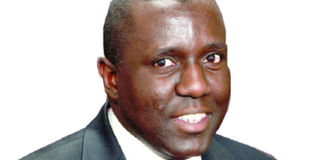How Uganda will miss VP Ssekandi

Vice President of Uganda (2011-2021), Speaker of Parliament (2001-2011), Deputy Speaker of Parliament (1996-2001). Mr Edward Ssekandi has served a very long time at the near helm of his country. An old boy of Lubiri Secondary School and St Mary’s College Kisubi, the vice president has lived in Uganda his entire life.
For years, he practiced as an advocate in Agip House where many lawyers went through his hands. He first partnered with one of the first women lawyers in Uganda Solome Kalule at a time when women were very few in the profession. One of Uganda’s first woman lawyer Christine Binaisa Kayitiro Kitumba qualified as a lawyer in the late 1960s and went on to rise and retire as a Supreme Court Justice.
Uganda’s first woman magistrate (my former boss) Leticia Mukasa Kikonyogo was called to the Bar in 1969 and rose to become first Woman Chief Justice. Uganda’s first female graduate of Makerere University’s Faculty of Law, Freda Blick Lule (daughter of Uganda’s first president Yusuf Lule) served as ambassador to France, Germany and other countries and did grace Uganda with the visit of John Paul II in 1993. Ms Blick Lule had other distinctions - she was the first woman to run for guild president at Makerere University at the start of her LLB course.
When I reflect on all these women whom I got to know in their different capacities and their successors, I also reflect on their great contributions to society. I also realised that the vice president like some of these pioneers, has also made his contribution even though quietly, but in a significant manner.
Between 1986 and 1991, Mr Ssekandi was the secretary of the Commission of Inquiry into violation of Human Rights in Uganda between 1971 and 1986, the highlight of which was the testimony of the late Paul Muwanga and Sgt Sokolo. In one ascerbic exchange, Paulo Muwanga ranted at John Nagenda, later the President’s media adviser, who was a member of the Commission as the rest of the Commission listened in stunned silence.
The first director of the Law Development Centre was Francis Sekandi who later became a Supreme Court (Court of Appeal Justice) but he was a few years later replaced by Mr Ssekandi. They are a few years apart, but often strangers confuse their names.
Ssekandi’s biggest photo impression has been stunned silence even when on the biggest stage. Troublesome media these days puts out a interesting reminder: “Edward Francis Ssekandi” is still the vice president of Uganda. Once I went to visit him in his office at the “twin towers.”
On that morning, the elevators had malfunctioned. Ministers, their acolytes were in confusion as the single elevator could only take one person at a time.
Then out of nowhere an orderly in his office came to pick me up and take me to the “president’s lift.” He mentioned to everyone he had come to pick one person.
On another occasion at the height of the famous or infamous Katosi retributions, I went to Pope Paul Community centre. Unlike most Catholics, I do not enjoy alcohol and went completely dry six years ago. The VP came to the counter where I was waiting for someone and offered me a drink. That Coca-Cola brightened my day.
I first came face-to-face with this reservation when I attended Primary One with his daughter Fiona at Kampala Parents School. Fiona whose hair was plaited, always sat with stunned silence in class as the rest of the class chirped around, made noise, etc. In later life Fiona changed but that impression has lasted a lifetime. So when people start bothering Ssekandi wondering whether he is about to laugh this studious silence has a genetic print.
If the vice president chooses to retire, he should be encouraged to start leading the political transition from one president to another. I see him as a sufficiently modest arbiter. He has lived in Uganda his entire life. Even when people did not have sugar to put in their black tea, Ssekandi was here. This gives him a better perspective of things.
Also after nearly four decades of a fragile civilian-military political system, with civilians subordinate to the military rather than vice versa, he does not come with the baggage of say former Prime Minister Amama Mbabazi, who is first a soldier, then an intelligence officer and super-efficient administrator.
Mr Ssemogerere is an Attorney-At-Law and an Advocate.




